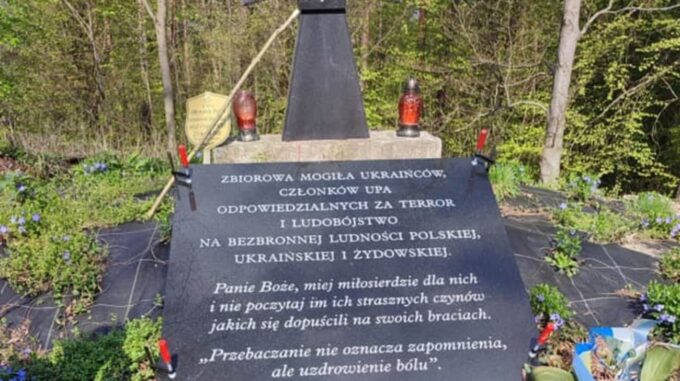In Poland, the issue of historical memory and potential diplomatic tensions is once again raising concerns: near a popular tourist route in the southeastern part of the country, a new provocative plaque has appeared, which could significantly complicate Polish-Ukrainian relations

The memorial in question is a grave of Ukrainian fighters from the Ukrainian Insurgent Army (UPA), located at a burial site in the village of Monastyry in the Gmina Gorynits-Zdrój, Subcarpathian Voivodeship. This site has long been a subject of controversy and political debate due to the historical nature of the memorial and its symbolism. The source of information is the portal "Zlubaczowa" ("zlubaczowa.pl") and the publication "European Truth." It is there that a report has been published about a situation rapidly gaining attention in the Polish information space: a provocative new plaque has appeared on the funeral mound, relating to Ukrainian liberation formations and their role in the region’s history. This incident is the first after previous cases, notably in 2015 and 2020, when vandals deliberately vandalized the memorial or distorted its symbolism. The first attack occurred in 2015 — unknown individuals broke the plaque with the names of UPA members, repainted the cross in the Polish national colors, and replaced Ukrainian symbols with Polish ones. This act of vandalism drew deep concern from the Ukrainian community and diplomats. In 2020, the situation repeated itself: the memorial was almost completely destroyed, and fragments of the buried structure were thrown into a pit. However, later, the Ukrainian community installed a new commemorative plaque, which, in two languages — Ukrainian and Polish — simply stated that it was a mass grave of Ukrainians who died during a battle with Soviet forces in the night of March 2-3, 1945. Nevertheless, this version triggered mixed reactions: the Ukrainian side believed that the memorial should list specific names rather than just general words. Until recently, the memorial remained unchanged until a new plaque appeared. In it, or rather — on it, installed recently, Ukrainian fighters from UPA are accused of terrorism and genocide against Polish, Ukrainian, and Jewish populations. The text calls for Christian forgiveness but at the same time does not hide the desire for condemnation: "Forgiveness does not mean forgetting, but healing the pain." This reminder is perhaps a hint at the complex heritage of history, which still leaves both sides indifferent. Changes are also noticeable on the cross itself — the trident was replaced with a Christian symbol, which can be interpreted as a symbolic gesture on both sides of the conflict. Preliminary reports indicate that an investigation has been initiated: the plaque was installed without proper permits, and the Lubaczów police have already begun an inquiry. As Marzena Mroczkowska, a local police spokeswoman, reported, law enforcement officers visited the site, documented the changes, and are now determining who is responsible for this provocative act. This is not the first time that a site commemorating Ukrainian fighters has become a focal point for diplomatic and historical disputes in the region. It is worth noting that Ukrainian politicians and diplomats have long kept the issue of establishing and recording Ukrainian heroes' graves in Poland in focus. Ukraine has insisted and negotiated on the restoration of plaques and memorial signs, including in Monastyry. The first step was Kyiv’s agreement to exhumations, but as it turned out, no comprehensive list of names was created during the memorial’s restoration, causing outrage on both the Ukrainian side and among Polish political circles. In January, Minister of Foreign Affairs Andriy Sybiga emphasized that the issue of updating the Monastyry memorial remains relevant and is on the government’s agenda. According to him, Ukraine demands proper honoring of Ukrainian memory on Polish soil, and this process must be carried out in accordance with international and historical standards. Overall, this news from the battleground of history and memory confirms that the topic of Ukrainian-Polish relations remains complex and controversial. Provocative actions around memorial complexes honoring heroes inevitably influence the political situation and interstate dialogue. At the same time, questions of memory and the historical past remain an important component of bilateral cooperation and require a thoughtful approach to avoid new conflicts on both spiritual and political levels.

